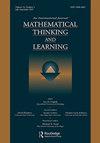Students’ participation in mathematics in inclusive classrooms: a study of the enacted mathematical and relational knowing of teachers
IF 1.5
4区 教育学
Q2 EDUCATION & EDUCATIONAL RESEARCH
引用次数: 0
Abstract
Given the need to increase equity in mathematics education, this study draws on earlier research connecting the mathematical and relational knowing of teachers to determine how such combined knowing enables elementary school students’ inclusion in mathematics. Through a participatory perspective on learning based on social practice theory, empirical examples in the results illustrate how the mathematical and relational knowing of teachers enables diverse participation in communities of classroom mathematics. For students’ spatial, social, and mathematical inclusion in the classroom, the enactment of both mathematical and relational knowing of teachers is important. Further, the results indicate that this enactment of both mathematical and relational knowing can be made by one or two co-teachers. Thus, when advocating for inclusive and quality mathematics education for all students, the mathematical as well as the relational knowing of teachers ought to be considered.包容性课堂中学生对数学的参与:教师制定的数学知识和关系知识的研究
鉴于需要增加数学教育的公平性,本研究借鉴了早期的研究,将教师的数学知识和关系知识联系起来,以确定这种组合知识如何使小学生融入数学。通过基于社会实践理论的参与式学习视角,结果中的实证例子说明了教师的数学和关系知识如何使课堂数学社区的多样化参与成为可能。对于学生在课堂上的空间、社会和数学包容,教师的数学知识和关系知识的制定是重要的。此外,研究结果表明,数学知识和关系知识的建立可以由一名或两名共同教师完成。因此,在提倡面向全体学生的包容性和高质量的数学教育时,教师的数学知识和关系知识都应该得到考虑。
本文章由计算机程序翻译,如有差异,请以英文原文为准。
求助全文
约1分钟内获得全文
求助全文
来源期刊

Mathematical Thinking and Learning
EDUCATION & EDUCATIONAL RESEARCH-
CiteScore
4.40
自引率
6.20%
发文量
18
 求助内容:
求助内容: 应助结果提醒方式:
应助结果提醒方式:


